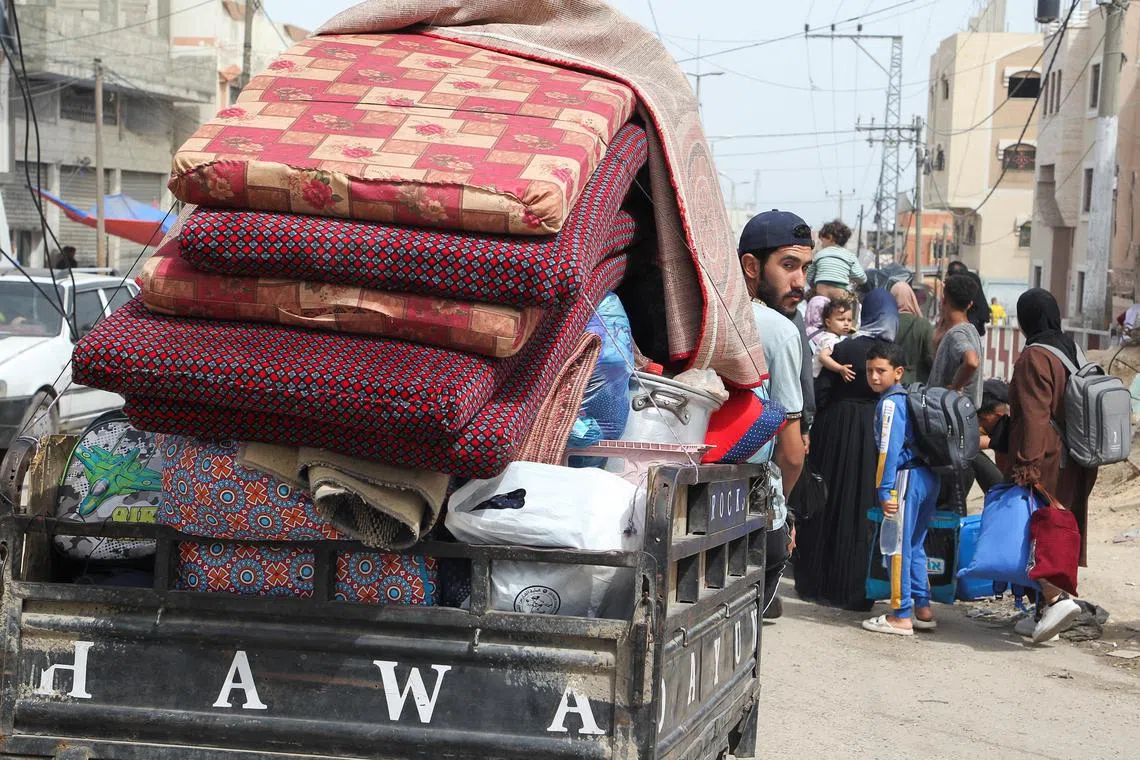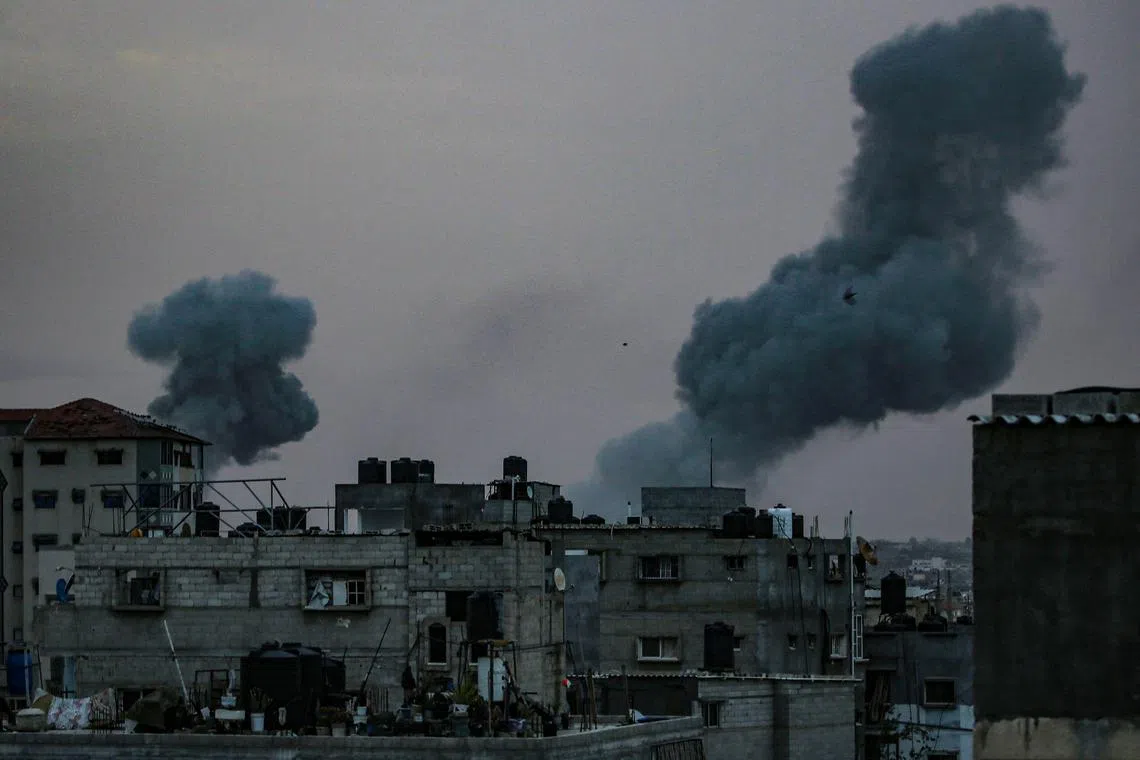Fighting rages across Gaza as UN chief urges ‘immediate ceasefire’
Sign up now: Get ST's newsletters delivered to your inbox

Palestinians prepare to evacuate, after Israeli forces launched a ground and air operation in the eastern part of Rafah, on May 11.
PHOTO: REUTERS
RAFAH, Palestinian Territories - Israel launched strikes on Gaza and troops were battling militants in several areas of the Palestinian territory after an Israeli evacuation order sent hundreds of thousands of Palestinians fleeing from Rafah.
More than seven months into the Israel-Hamas war, UN chief Antonio Guterres urged “an immediate humanitarian ceasefire, the unconditional release of all hostages and an immediate surge in humanitarian aid” into the besieged Gaza Strip.
“But a ceasefire will only be the start,” he told a donor conference in Kuwait. “It will be a long road back from the devastation and trauma of this war.”
As Egyptian, Qatari and US mediation efforts towards a truce appeared to stall, US President Joe Biden said on May 11 a ceasefire could be achieved “tomorrow” if Hamas released the hostages held in Gaza since the Oct 7 attack that sparked the war.
AFP correspondents, witnesses and medics said Israeli air strikes pounded parts of northern, central and southern Gaza during the night and into the morning of May 12.
In Rafah, Gaza’s southernmost city which sits on the Egyptian border, the Kuwaiti hospital said on May 12 it had received the bodies of “18 martyrs” killed in Israeli strikes over the past 24 hours.
Gaza’s civil defence agency reported at least two fatalities, a father and son, both doctors, in a strike on Deir al-Balah in central Gaza.
Months after Israel said it had dismantled Hamas’s command structure in northern Gaza, which was devastated by intense violence in the early stages of the war, fighting has resumed in recent days in Jabalia refugee camp and Gaza City’s Zeitun neighbourhood.
Military spokesman Rear Admiral Daniel Hagari said late on May 11 that “in recent weeks we have identified attempts by Hamas to rebuild its military capabilities in Jabalia, and we are acting to destroy these attempts”. He also said there was an operation in Zeitun.
AFP correspondents reported intense clashes and heavy gunfire from Israeli helicopters in the Zeitun area early on May 12, with medics and witnesses saying troops were engaged in combat in Zeitun as well as Jabalia.
Inhumane displacement
The war began with Hamas’s unprecedented October 7 attack on Israel, which resulted in the deaths of more than 1,170 people, mostly civilians, according to an AFP tally of Israeli official figures.
During their attack, militants also seized hostages, of whom scores were freed during a one-week truce in November. Israel estimates 128 captives remain in Gaza including 36 who the military says are dead.
Israel’s retaliatory offensive has killed at least 34,971 people in Gaza, mostly women and children, according to the Hamas-run territory’s health ministry.
Israel defied international opposition this week and sent tanks and troops into eastern Rafah, effectively shutting a key aid crossing.
The military on May 11 expanded an evacuation order for eastern Rafah and said 300,000 Palestinians had left the area.
The UN agency for Palestinian refugees, UNRWA, gave a similar estimate of “around 300,000 people” who have fled Rafah over the past week, decrying in a post on X the “forced and inhumane displacement of Palestinians” who have “nowhere safe to go” in Gaza.
Palestinians in Rafah, many of them displaced by the fighting elsewhere in the territory, piled water tanks, mattresses and other belongings onto vehicles and prepared to flee again.
“The artillery shelling didn’t stop at all” for several days, said Mr Mohammed Hamad, 24, who has left eastern Rafah for the city’s west.
“We will not move until we feel that the danger is advancing to the west,” he said.
“There is no safe place in Gaza where we can take refuge.”

Smoke rising above buildings during an early morning Israeli strike on Rafah, in the southern Gaza Strip, on May 11.
PHOTO: AFP
Residents were told to go to the “humanitarian zone” of Al-Mawasi, on the coast northwest of Rafah, though aid groups have warned it was not ready for an influx of people.
EU chief Charles Michel said on social media that Rafah civilians were being ordered to “unsafe zones”, denouncing it as “unacceptable”.
Mr Hisham Adwan, spokesman for the Gaza crossings authority, told AFP on May 12 that the Rafah crossing has remained closed since Israeli troops seized its Palestinian side on May 7, “preventing the entry of humanitarian aid” and the departure of patients in need of medical care.
He said Israeli forces “have advanced from the eastern border” about 2.5km into Rafah.
Egypt’s state-linked Al-Qahera News on May 11 said Cairo had refused to coordinate with Israel on aid deliveries via the Rafah crossing.
Al-Qahera cited a high-ranking source as saying Egypt had “warned Israel of the repercussions of its continued control over the Rafah crossing, and held it fully responsible for the deterioration of the humanitarian situation in the Gaza Strip”.
International outrage mounted at the long-threatened operation in Rafah, with Israel’s close ally the United States having paused the delivery of 3,500 bombs as it appeared ready to invade the city.
Mr Guterres on May 10 said Gaza risked an “epic humanitarian disaster” if Israel launched a full-scale ground operation in Rafah, where the UN says 1.4 million have been sheltering.
Mr Hagari on May 11 said troops “eliminated numerous terrorists in close-quarters combat” and in air strikes on the city.
Protests against the war spread to the Eurovision Song Contest in Sweden, where thousands rallied outside the Malmo Arena condemning Israel’s participation.
Israeli Prime Minister Benjamin Netanyahu, who faced increasing domestic pressure to secure the release of the remaining hostages, has pledged to “eliminate” Hamas battalions in Rafah.
Israeli protesters on May 11 again took to Tel Aviv’s streets to pressure their government to do more to reach a truce and hostage release deal.
The rally came hours after Hamas’s armed wing said one of the hostages, Israeli-British man Nadav Popplewell, had died in captivity. The Israeli military did not offer any comment on the Hamas video statement. AFP


